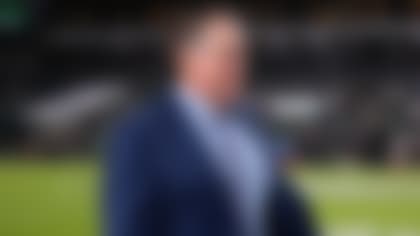To say that USC has been rebuilt in the 1,460 days since it was handed crippling NCAA sanctions would be both an understatement and a literal truth. In fact, few athletic departments across the country have gone through as much change in four years as the one located in the heart of Los Angeles has.
While school officials will likely quietly celebrate the end of NCAA sanctions Tuesday morning in sparkling new facilities, the effects of what happened in the school's infraction case will be felt for decades to come. There are plenty of opinions -- and misconceptions -- about the case, but it should nevertheless stand as one of the biggest moments in the history of NCAA enforcement and occupy an unenviable spot in the illustrious history of the Trojans' prestigious football program.
For as much notoriety that the famed SMU death penalty case has accumulated over the years in the pantheon of college football lore, those associated with it have to recognize that it doesn't come close to the, well, Hollywood pizzazz that the USC case brought to the table.
National championships. Heisman Trophies. Snoop Dogg. Will Ferrell. Parties. Houses. TV's. International phone calls. Cash envelopes. And, of course, there was Big Worm.
Even the script writers studying at USC's famed School of Cinematic Arts would have a hard time dreaming up all of the elements that went into the case. Combined with USC's unprecedented run of success on the football field (and, to a lesser extent, on the basketball court), it is easy to see why there was such intense media interest -- and for some fans, general disdain -- in the program over the past decade.
At the center of the case was violations surrounding current Detroit Lions running back Reggie Bush and current Milwaukee Bucks guard O.J. Mayo. The school was deemed culpable of major violations and cited for lack of institutional control in June of 2010 by the NCAA's Committee on Infractions and punished severely. The football team was banned from going to a bowl game for two seasons and had 30 scholarships taken away over a three-year period. USC also skipped out on the postseason in hoops, among other penalties. The imposed probation period ran for four years and ended when the clock struck midnight on June 9, 2014.
For those that claimed the Trojans needed to be hammered, they certainly were. As time went on however, the committee's decision looked increasingly perverse. Despite lacking direct evidence that the school knew of Bush's illicit benefits (all the report stated was that an assistant coach "knew or should have known" about them), USC was docked more scholarships than the next five BCS schools who committed major violations combined. It's hard to see how the punishment fit the crime in retrospect given cases at Miami, Ohio State and Oregon, among others.
Former athletic director Mike Garrett famously quipped afterward: "As I read the decision by the NCAA ... I read between the lines and there was nothing but a lot of envy. They wish they all were Trojans."
That defiant attitude framed the case for many, adding to the perception that USC was uncooperative in the investigation (the NCAA said they actually met all obligations to cooperate). That Garrett avoided media questions like the plague did him and the school no favors, either.
Yet lost in the uproar you'll hear from USC fans about the unfair nature of the case and its penalties is the fact that the school undoubtedly lacked institutional control. That Garrett, a former Heisman winner at the school, had a better handle on the golf course with boosters than he did his department was but one reason why he was shown the door two months after the ruling.
Perhaps the biggest thing the sanctions forced the school to do was finally clean house before they could, quite literally, rebuild it. The Trojans' current organization chart has only a handful few key names that trace back to four years ago. Despite the ominous outlook the football program faced at the time, there were suddenly new decision makers. At the normally laid-back campus, attitudes changed.
A new president installed Pat Haden to replace Garrett. The former USC quarterback and NBC commentator quickly brought in enough lawyers at key positions to form his own law firm. The compliance office, once overworked and understaffed, soon found offices steps from assistant coaches. In what should be considered a long-term success story spurred on by the case, the Trojans went from a laggard in compliance to one of the leaders, complete with one of the largest offices in the country.
"It's a different environment," Haden recently told the LA Times. "One of my real challenges at first was trying to adopt and embrace this culture of compliance and not suck all the fun out of sport by everybody looking over their shoulder. 'Hey, you're riding a new bike. Where did you get that bike?' That was difficult. I think we may have erred in the first year or so on being too observant and almost accusatory. I think we've done it better the last two years."
In what was a good indicator as to the position Haden has taken on compliance issues, he was tapped to a working group that helped reform the NCAA's enforcement process two years ago.
While a transformation occurred on the inside of the USC athletic department, there was also a cosmetic counterpart. After decades of subpar facilities, a $70 million football facility was constructed to bring the program into the modern age. The creaky, stained tiles that then-sophomore Matt Barkley had to face the media on when the sanctions were announced were literally thrown out as the school completed a $35 million renovation of Heritage Hall next door.
The plans for both buildings had been in the works for years, but their importance, and quick completion, took on another meaning when the sanctions were handed down. Not much says a humbling experience quite like going through severe scholarship restrictions while the athletic department works in dental school offices across the street, but it happened.
Thanks to a pair of 10-win seasons and a 35-17 record during the four-year probationary period, the effectiveness of the NCAA's sanctions on the field seems a bit more dubious than it did when they were first handed down. While it has been a road filled with depth issues, injuries and transfers, the Trojans made it out the other end better than most. As former coach Lane Kiffin preached often when talking about restrictions, the success the school saw spoke to the "power of USC" as a football factory.
A top-five finish in 2011 and numerous top recruiting classes spoke to that. The 6-7 follow-up in 2012 after starting the preseason ranked No. 1 pointed to Kiffin's shortcomings as a head coach. Though he deserves credit for successfully navigating the scholarship limitations and recruiting a heap of NFL talent, antics and in-game management failures kept Kiffin from being anything more than just a caretaker as the program's leader. That he was already a polarizing figure to most of the country only hastened his departure from L.A.
Now it's up to another link to the past in Steve Sarkisian to get USC back into national-title contention. Despite the official end of the NCAA sanctions, however, it will likely be another two or three years before the Trojans' roster reaches full strength. The Southern California native has a difficult task given how competitive the Pac-12 has become in recent years, but he surely has more tools available than his predecessor.
At the same time the case poses a challenge for the current group of Trojans, it also makes it difficult to assess the legacies of some of those involved.
Garrett has his Heisman among those prominently displayed at Heritage Hall, but his closest connection to the school in recent years has been hiring former hoops star Cheryl Miller as the women's basketball coach at tiny NAIA school Langston, where he's now athletic director.
Bush was once the most popular and electrifying player in college football, but there is no trace of him on USC's campus thanks to the NCAA. Yet if one mentions his name to recruits, they'll often talk about how they grew up watching him in action at the Coliseum back in the day. He's had an up-and-down career in the NFL but enters his ninth season in the league with a Super Bowl ring in hand and millions in his bank account.
Outside of a statement and a few short comments after the sanctions were handed out, Bush has kept quiet on the matter and failed to ever apologize for his or his family's actions.
"Reggie Bush is one of the greatest players ever to play college football," Haden told the Times. "I love watching Reggie play as much as anybody. But he made a mistake and we're still paying for it."
Former coach Pete Carroll remains beloved by fans of the school and even has a lounge area in the football building that bears his name. His timing in leaving for the Seahawks -- five months before sanctions were handed out -- prompted many to say he was getting out of town before the school was punished despite never being implicated in the NCAA's report. He's maintained that nobody inside the program thought things would be so dire with the NCAA and that he would have stayed at the school had he known what was coming.
There will always be doubters, but what Carroll was able to accomplish on the field at USC keeps him in rarified air in the college ranks: seven straight BCS bowls, seven straight Pac-10 titles, a pair of national championships and a winning percentage of 84 percent. In February, he became one of just three head coaches to win both a Super Bowl and a national title in college. If there's anybody who escaped the saga with their reputation fairly intact, it's Carroll.
The case isn't even over for former assistant Todd McNair. The link the Committee on Infractions used to peg Bush's rule breaking with the school, he was given a show cause that essentially prevented him from recruiting and he was later let go by the school. McNair later sued the NCAA and could soon see a courtroom as his case makes its way through the system. Judging by some of the arguments presented by both sides, it has the possibility of turning into a major headache for the NCAA that exposes several issues with their enforcement procedures if they don't settle.
Paul Dee, the former Miami AD who chaired the infractions committee that handed out penalties to USC, saw his Hurricanes program become one of a series of high-profile enforcement cases that made their way through the system in the aftermath of the Bush case. The wide-ranging disparity in penalties in many of them -- as well as the sheer number of cases starting with USC -- is one reason why a new enforcement structure was pushed through quickly at the NCAA.
As for Haden and his work, the jury might still be out. He's drawn praise for his ability to revamp the Trojans' facilities and how he's changed the culture around the department, especially with regards to academic and compliance priorities. Still, his popularity isn't what it once was after keeping Kiffin around too long and seeing the basketball program take several steps backward. He'll always have a place in Trojans' lore thanks to his time as under center in cardinal and gold, but as an AD going forward, he'll be judged on his hires of Sarkisian and basketball coach Andy Enfield.
USC has emerged from probation with a few nicks but faired better than all but the most optimistic Trojan fan could have predicted four years ago. The athletic department has been overhauled and the football team enters 2014 cautiously optimistic for the upcoming season and beyond. Tuesday may mark the official end of a dark chapter in USC history, but the school will clearly be shaped by it for years to come.
Follow Bryan Fischer on Twitter @BryanDFischer.












